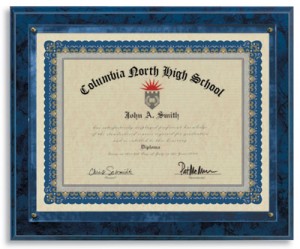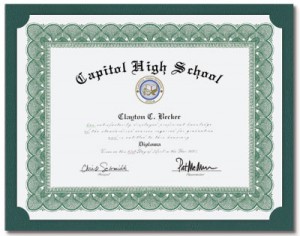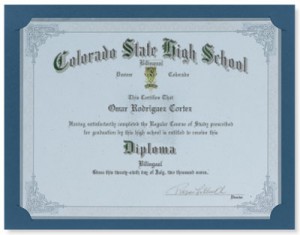 Not all diplomas are alike and must reflect the exact nature of the education that has been completed. Diploma types vary from school to school, and in most states, decisions about diploma requirements are made by state education officials.
Not all diplomas are alike and must reflect the exact nature of the education that has been completed. Diploma types vary from school to school, and in most states, decisions about diploma requirements are made by state education officials.
Students should speak with parents and counselors and think carefully before deciding which type of diploma is best for them. Ideally, students should decide on a curriculum before starting their freshman year, although it is sometimes possible to make changes to  the chosen curriculum after it’s begun. Students are not really locked into a certain diploma track once they start. Students may begin a curriculum that becomes too demanding and switch to a new track at some point. While switching tracks is OK in some cases, it’s not the best thing to do. Students who switch tracks often run the risk of overlooking a class requirement until late in the curriculum. This can lead to summer school or, even worse, a late graduation.
the chosen curriculum after it’s begun. Students are not really locked into a certain diploma track once they start. Students may begin a curriculum that becomes too demanding and switch to a new track at some point. While switching tracks is OK in some cases, it’s not the best thing to do. Students who switch tracks often run the risk of overlooking a class requirement until late in the curriculum. This can lead to summer school or, even worse, a late graduation.
The type of diploma a student chooses will affect future choices. Students who choose to  complete a vocational or technical prep diploma will be slightly limited in their options after high school. In most cases, this type of degree prepares students for entering the workplace or enrolling in a technical college.
complete a vocational or technical prep diploma will be slightly limited in their options after high school. In most cases, this type of degree prepares students for entering the workplace or enrolling in a technical college.
Many colleges require the completion of a college prep diploma as an admissions requirement. If you have would like to attend college, be sure to check the minimum admission requirement and plan your diploma track accordingly.
More selective schools require that students complete a more rigorous curriculum than the one required in a general college prep diploma, and those colleges may require an honors diploma, an advanced college prep diploma, or an International Baccalaureate diploma. You must carefully read the admissions requirements for each college or university to which you apply.
Different Types of Diplomas
| Technical/Vocational | Students must complete a combination of academic courses and vocational or technical courses. |
| General | Student must complete a certain number of credits and maintain a minimum GPA. |
| College Prep | Students must complete a state-mandated curriculum and maintain a certain GPA. |
| Honors College Prep | Students must complete a state-mandated curriculum that is complemented by additional rigorous coursework. Students must achieve a high academic level and maintain a certain GPA. |
| International Baccalaureate | Students must complete a specific two-year international curriculum to meet standards set by The International Baccalaureate Organization. This challenging curriculum is normally completed in the final two years of high school by qualified students who have completed a highly academic pre-baccalaureate curriculum. |
